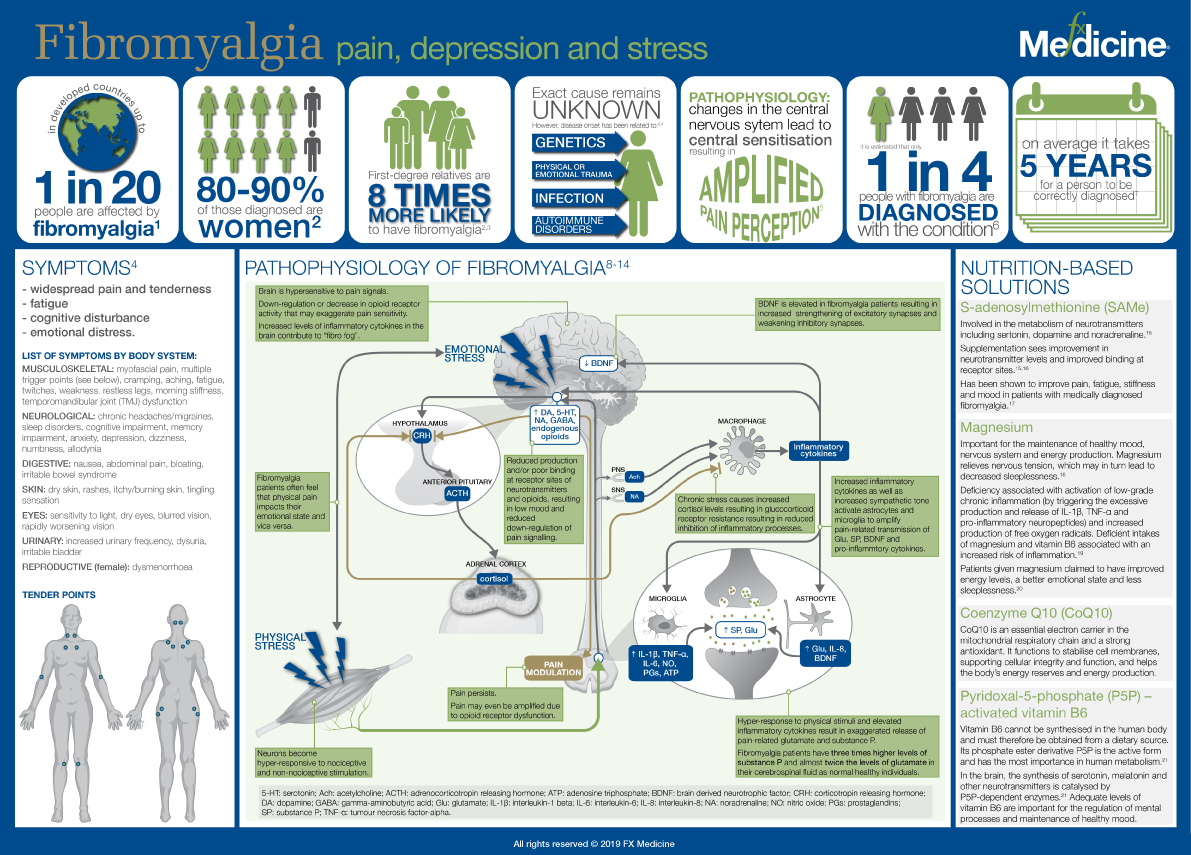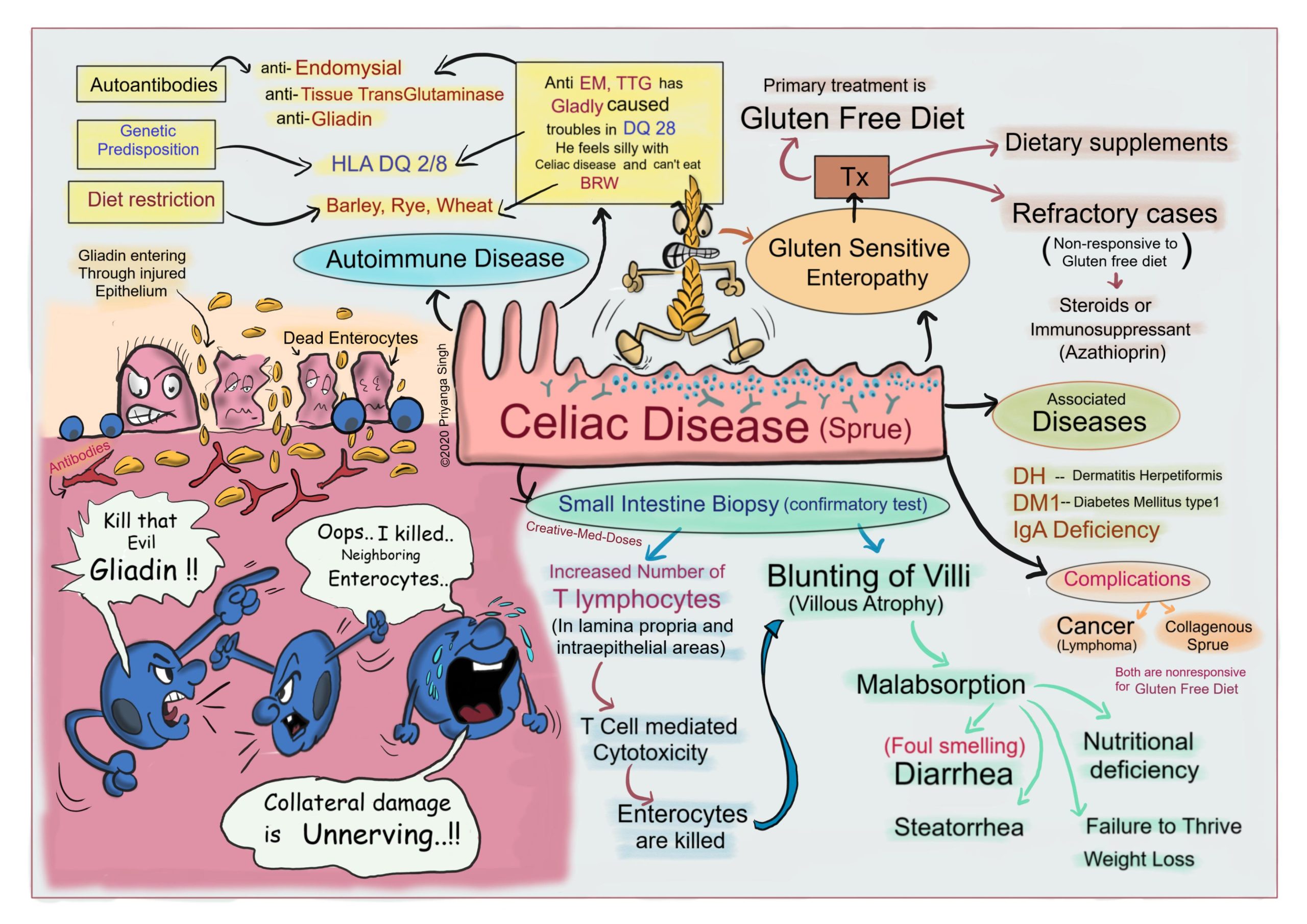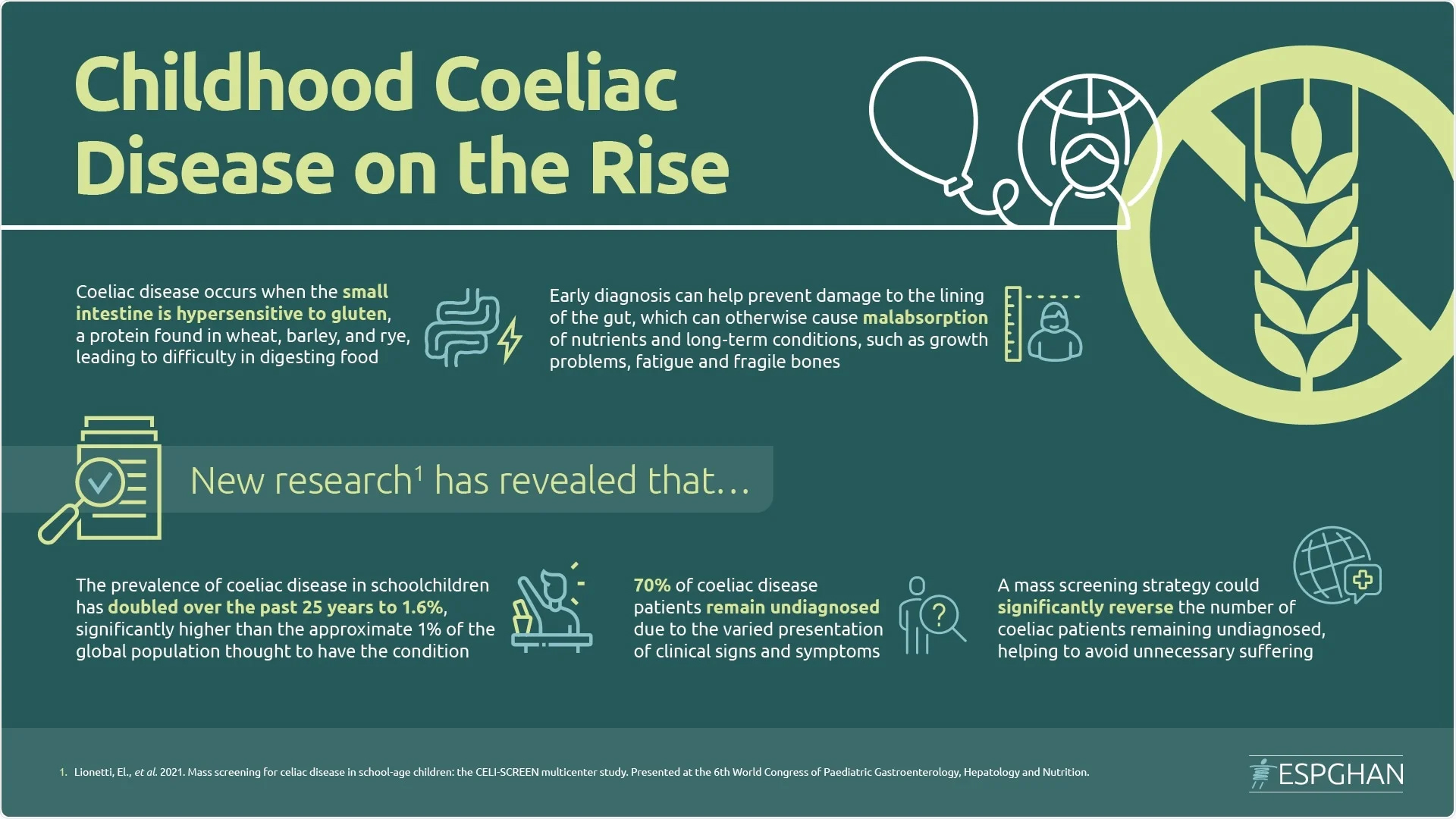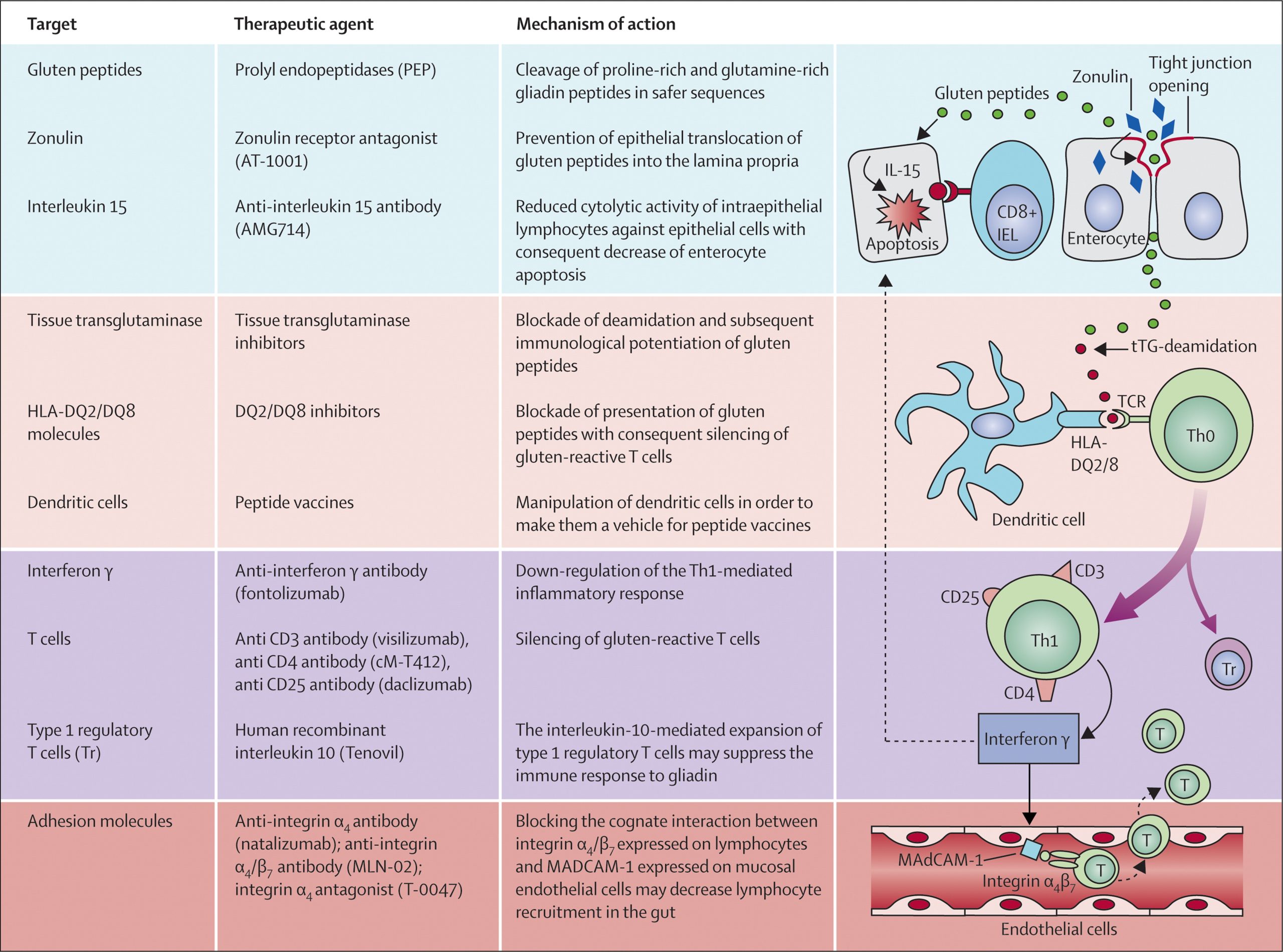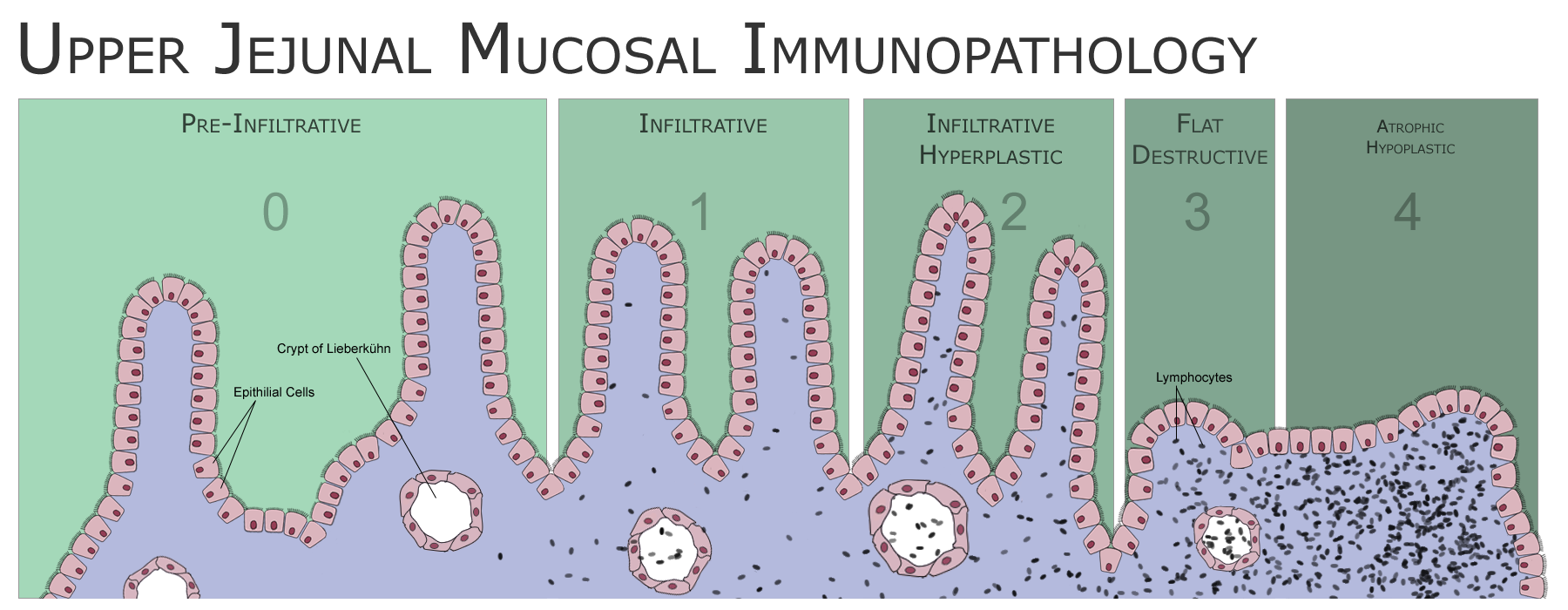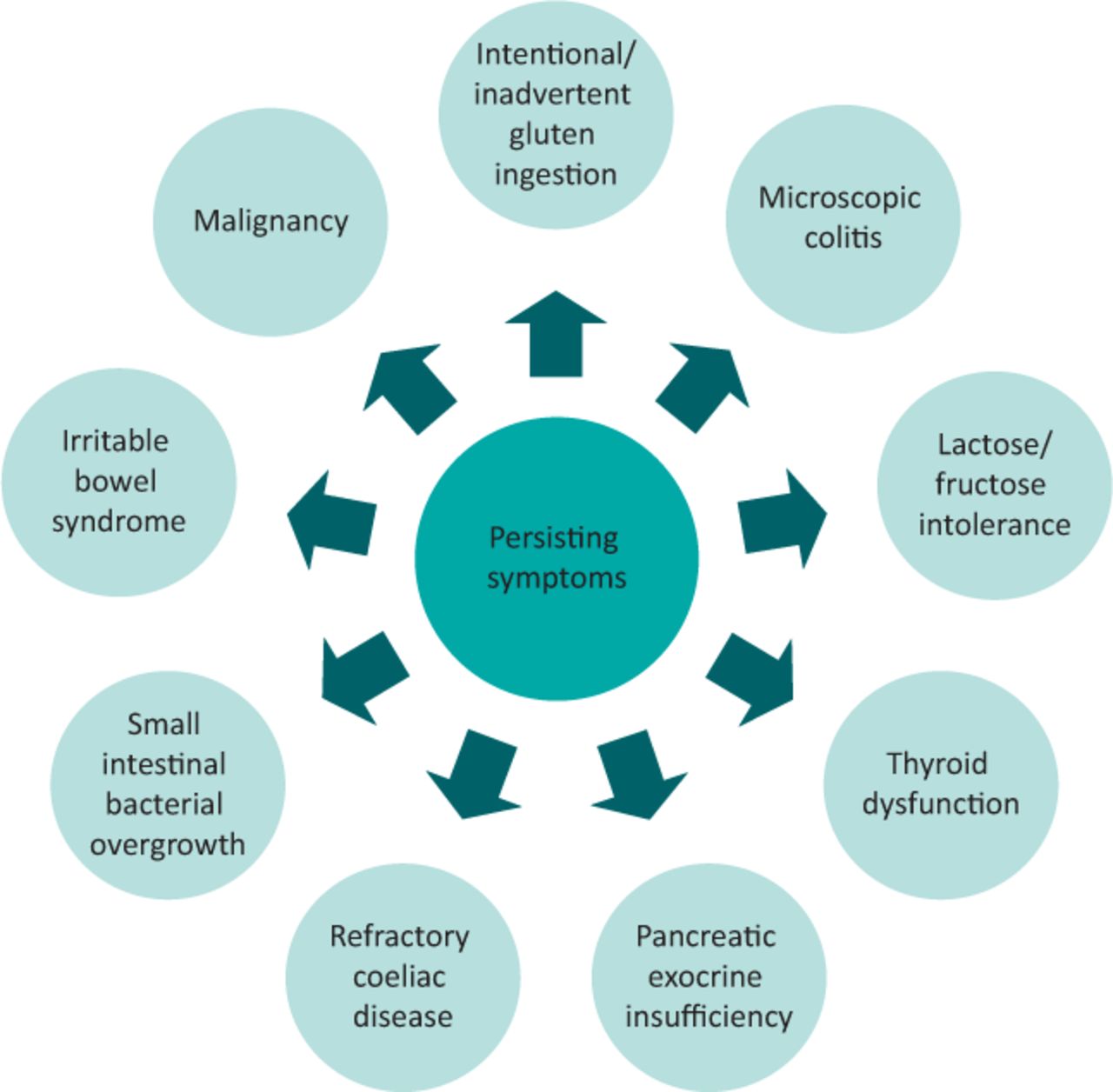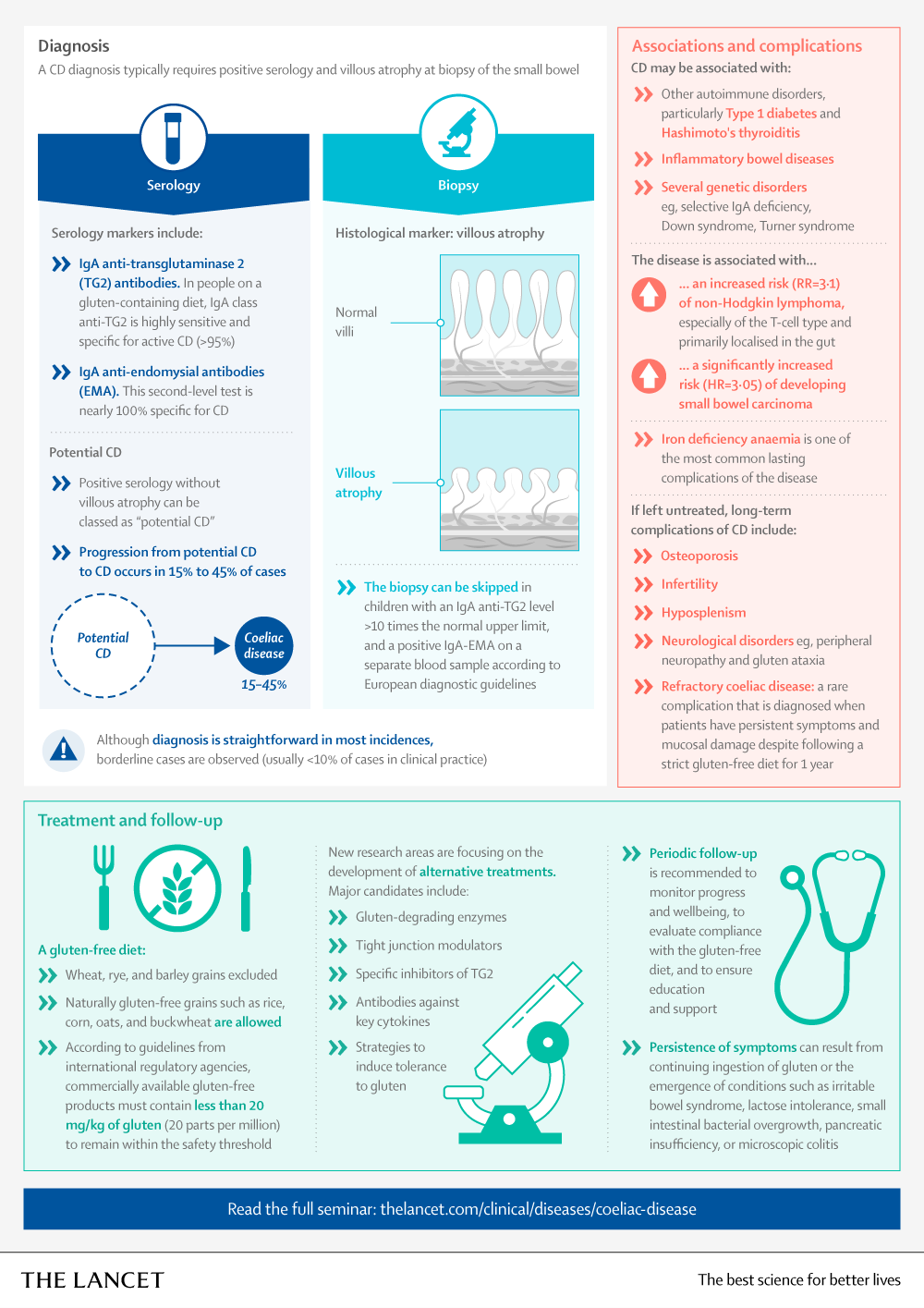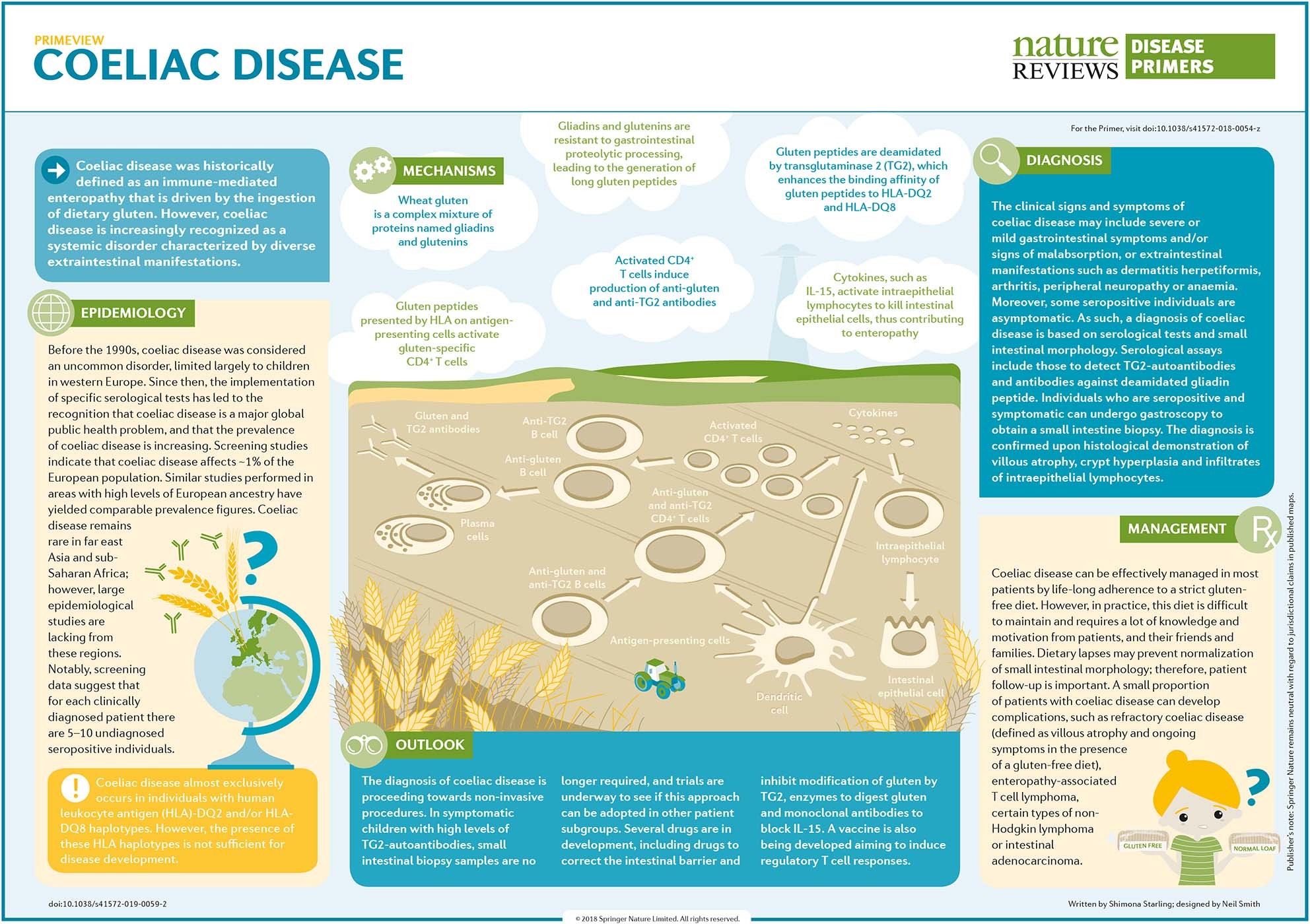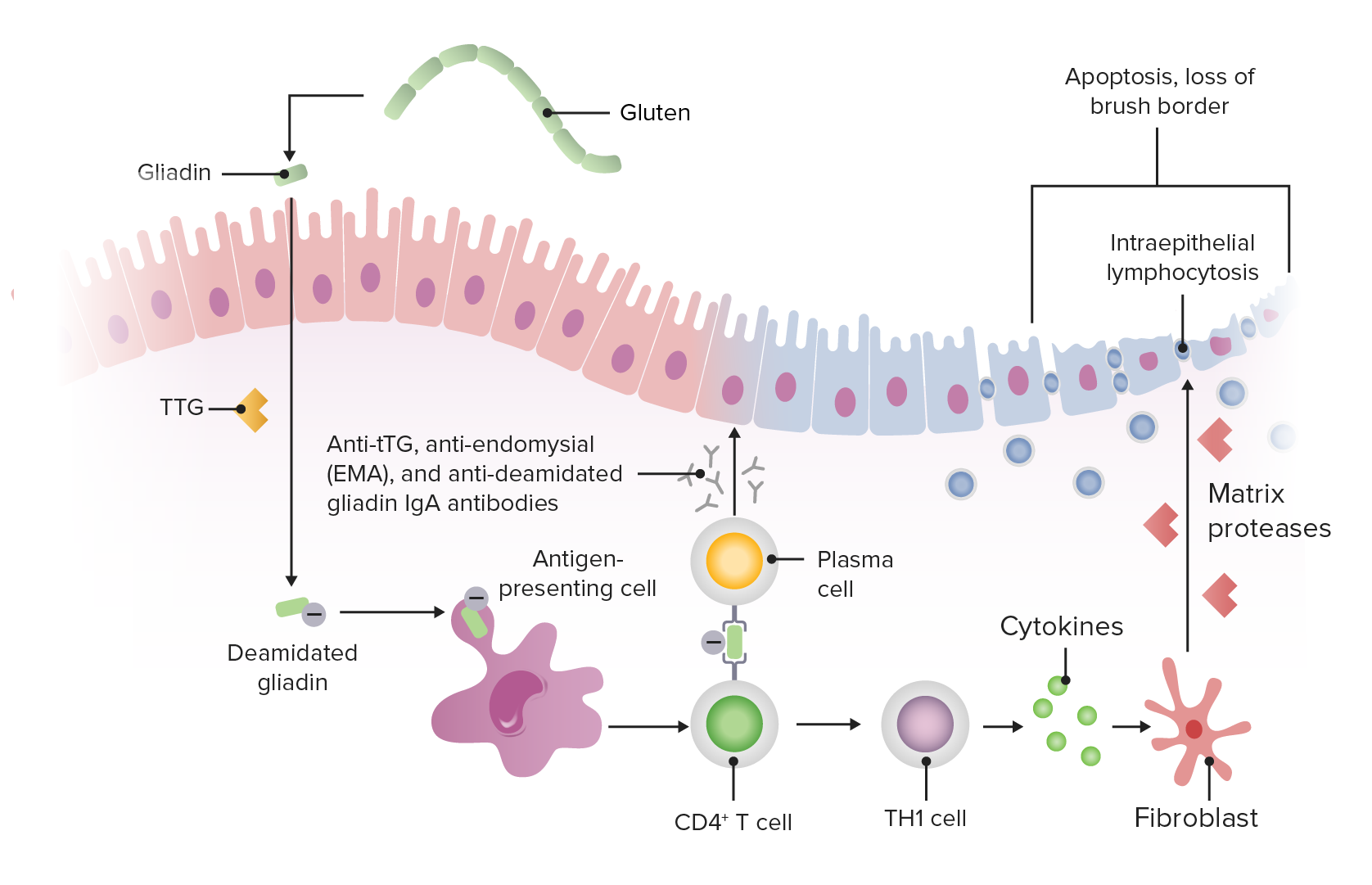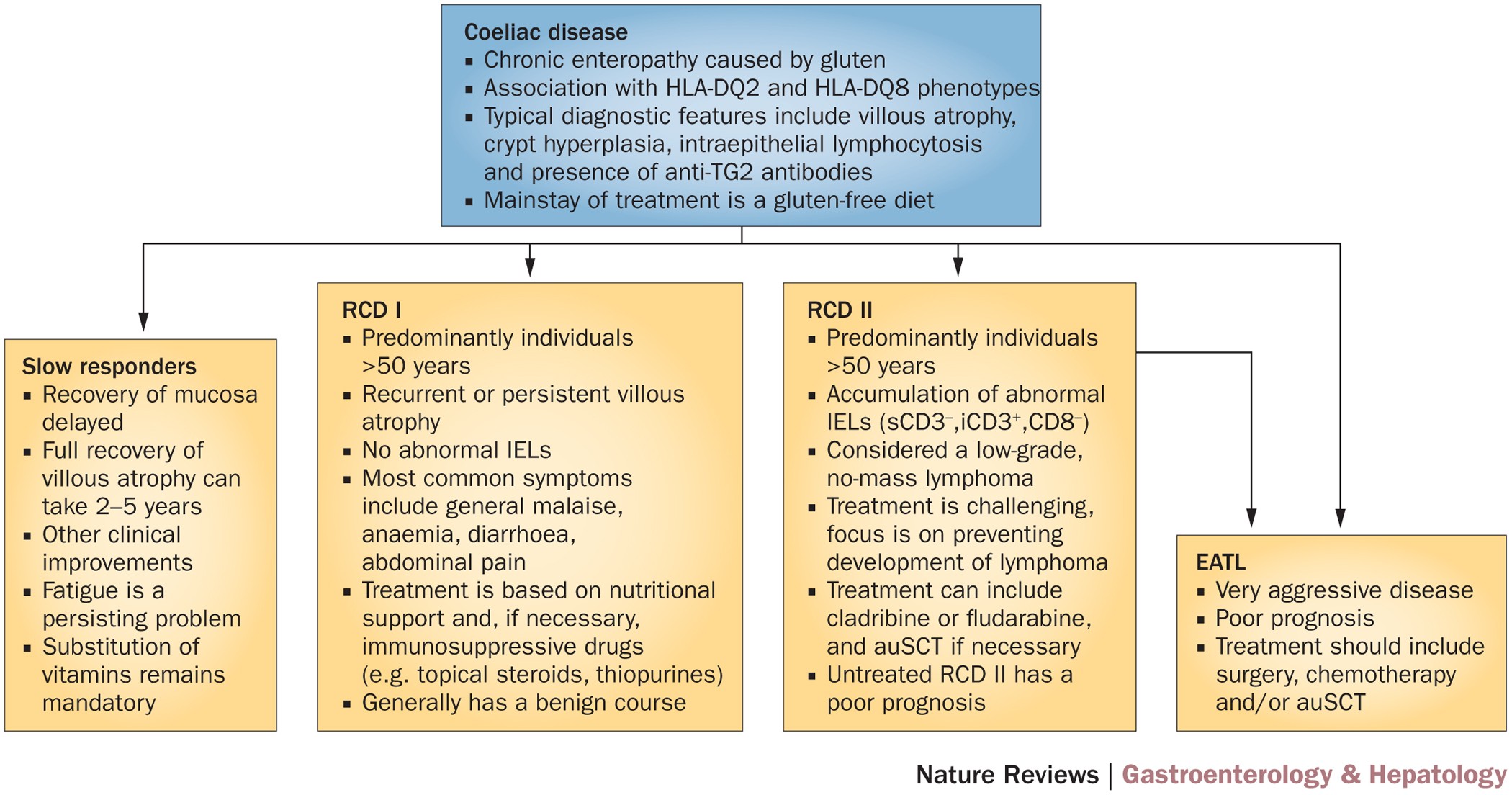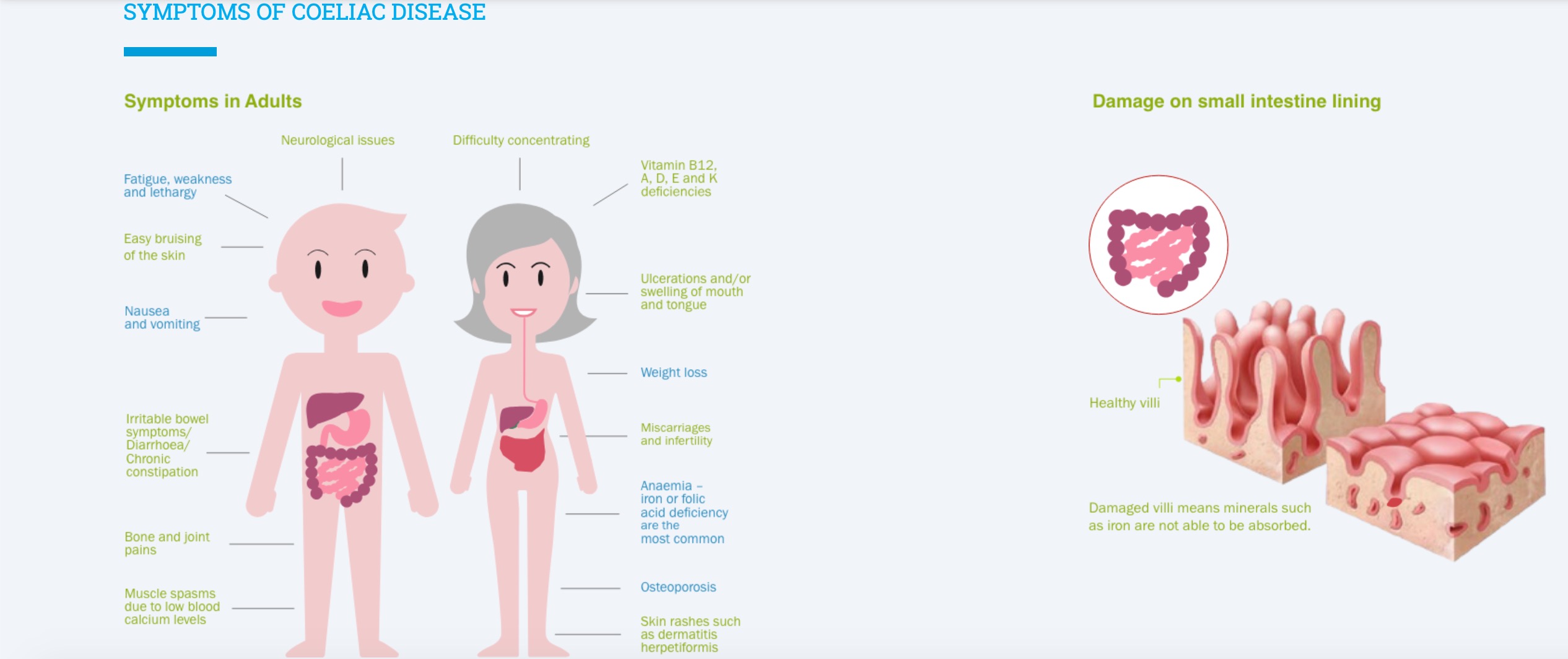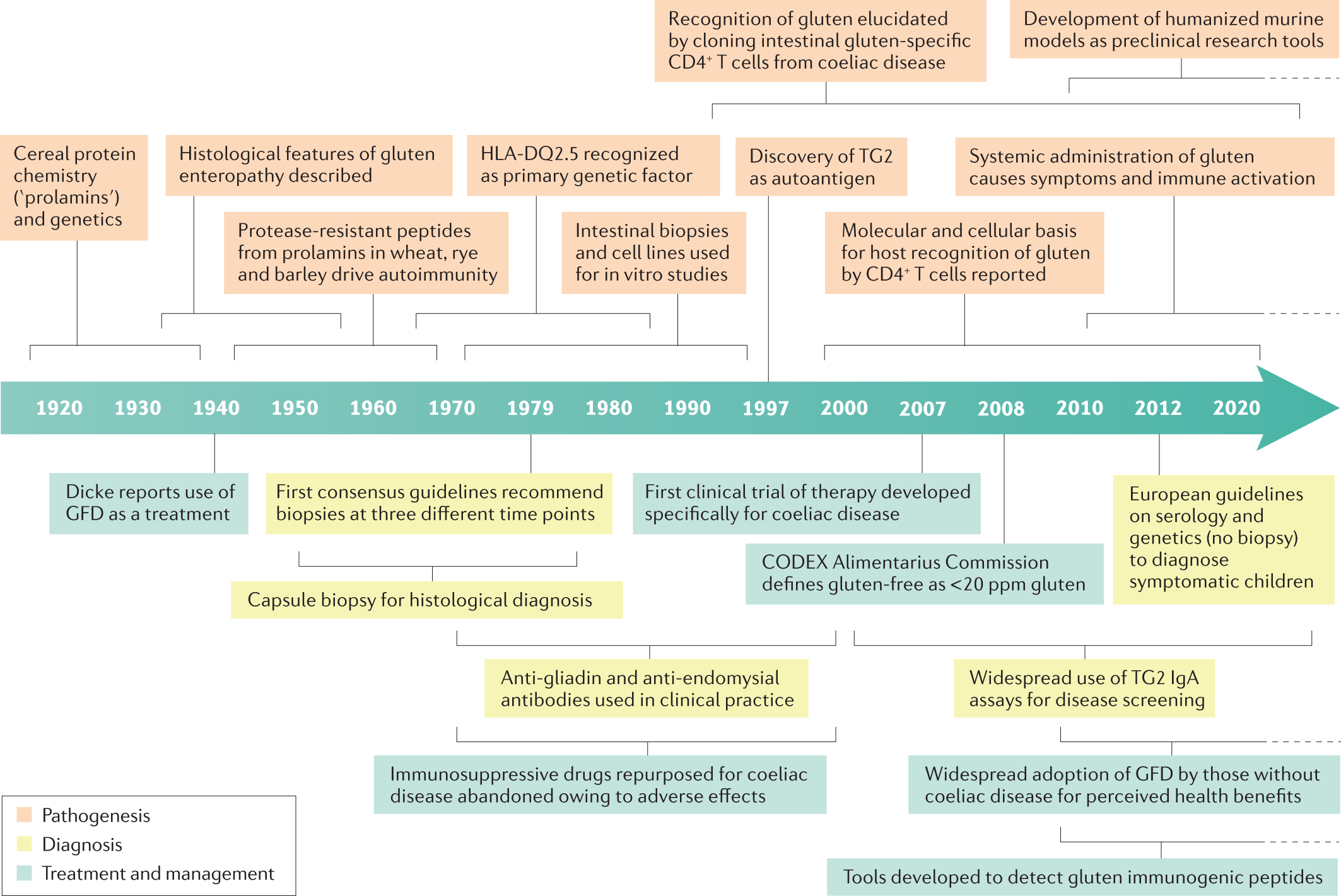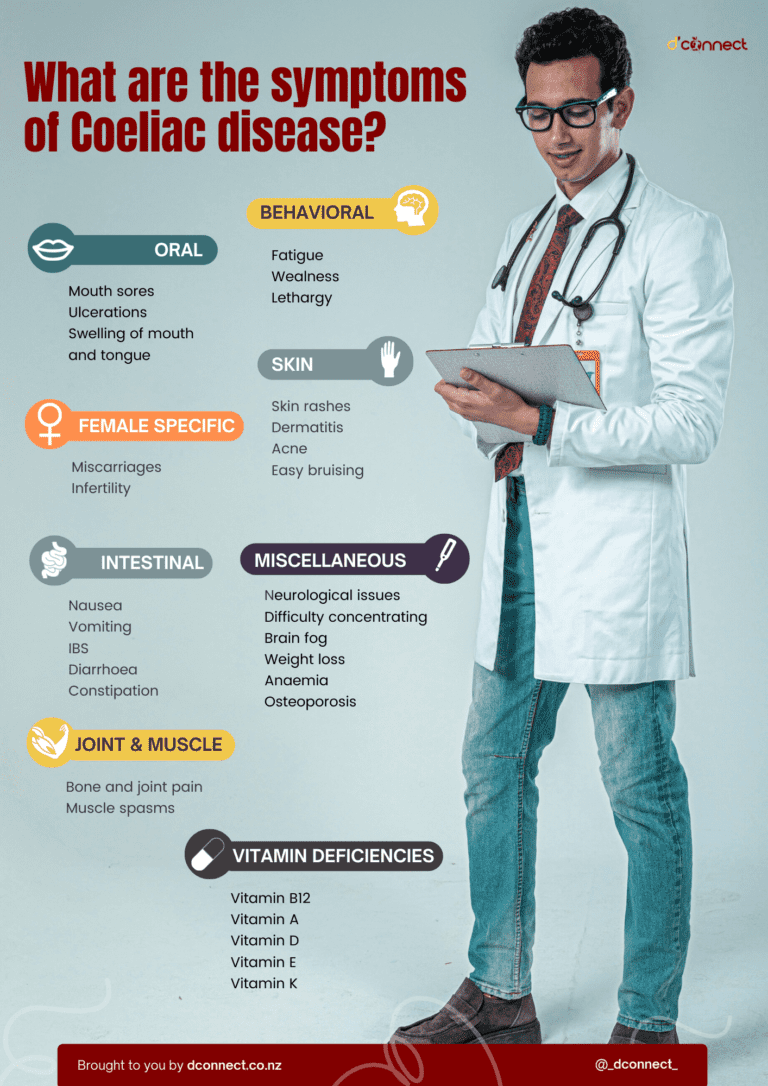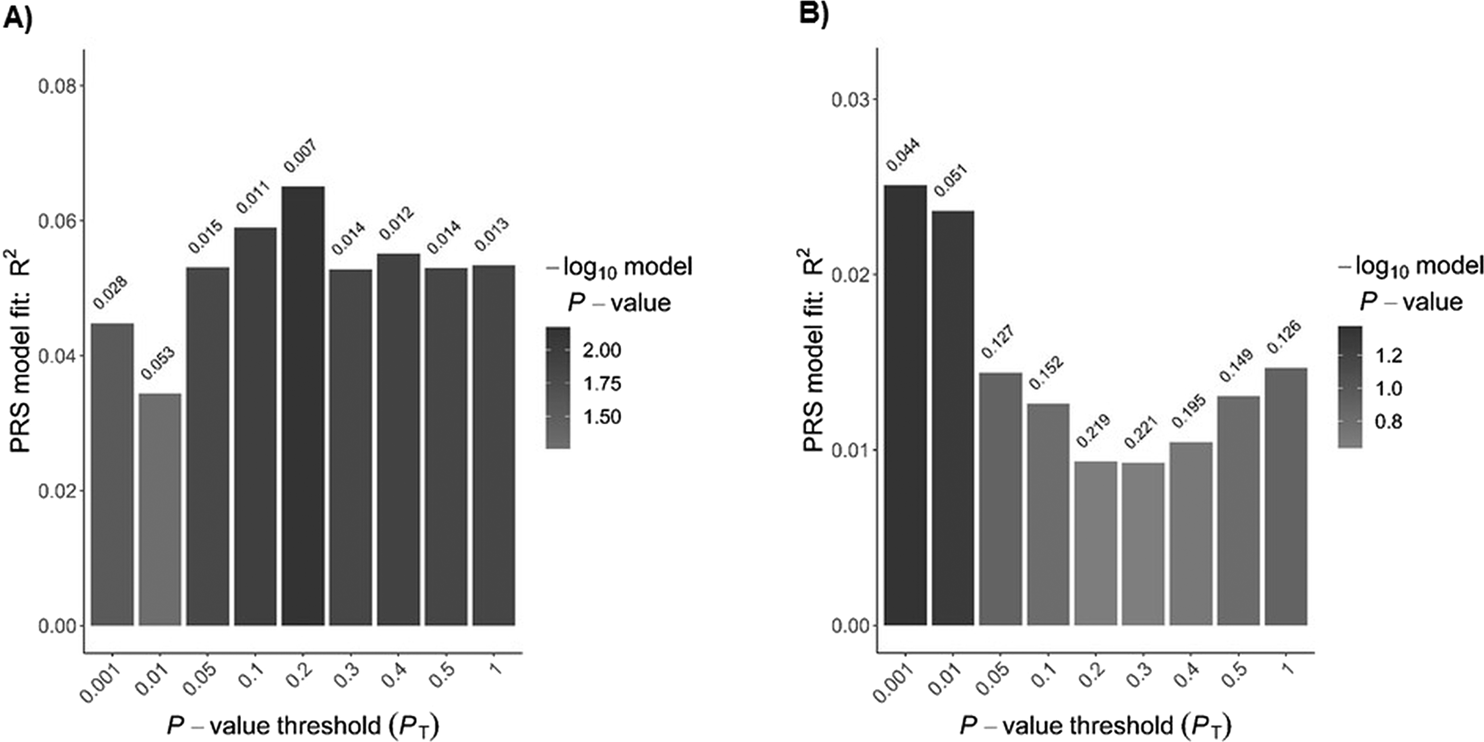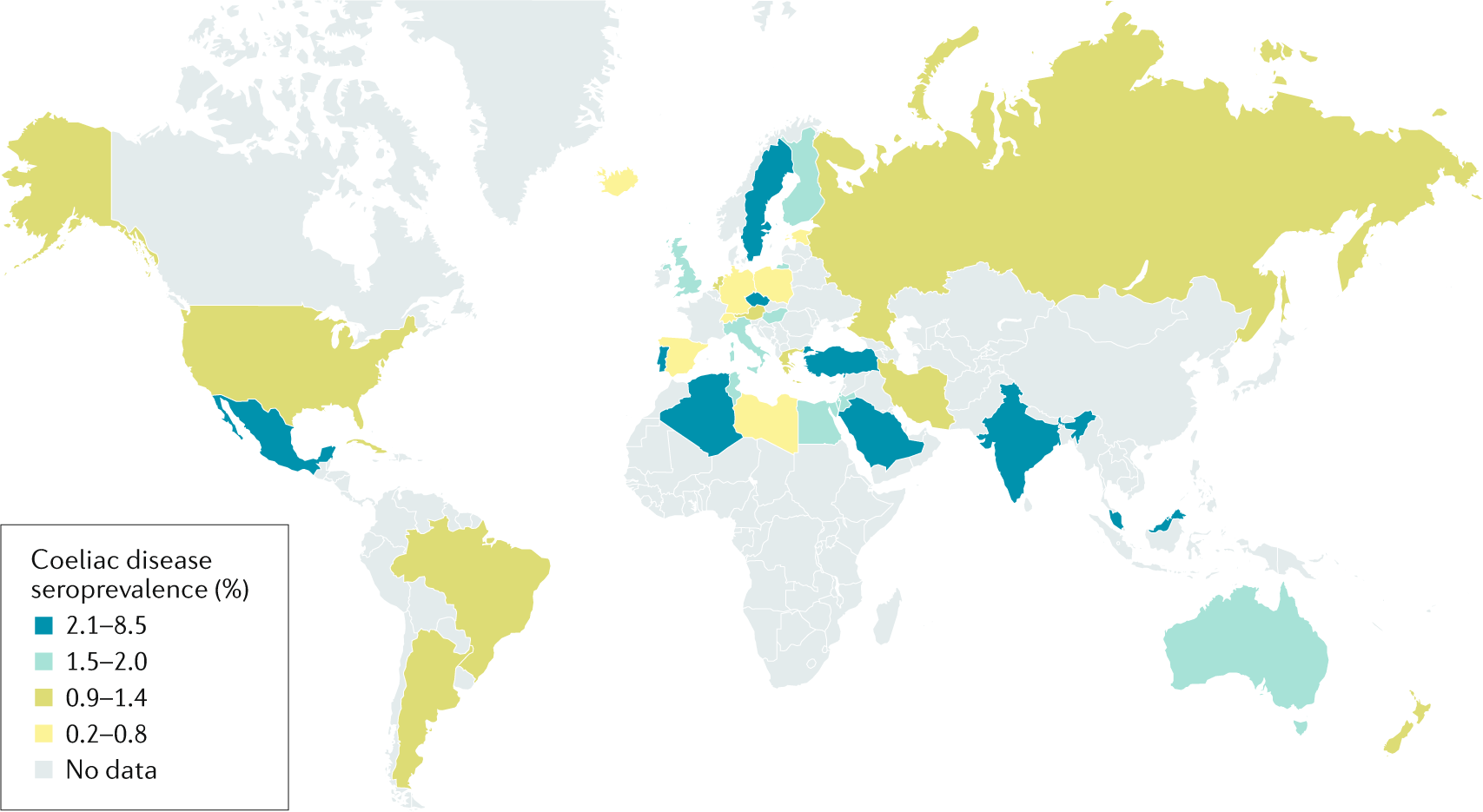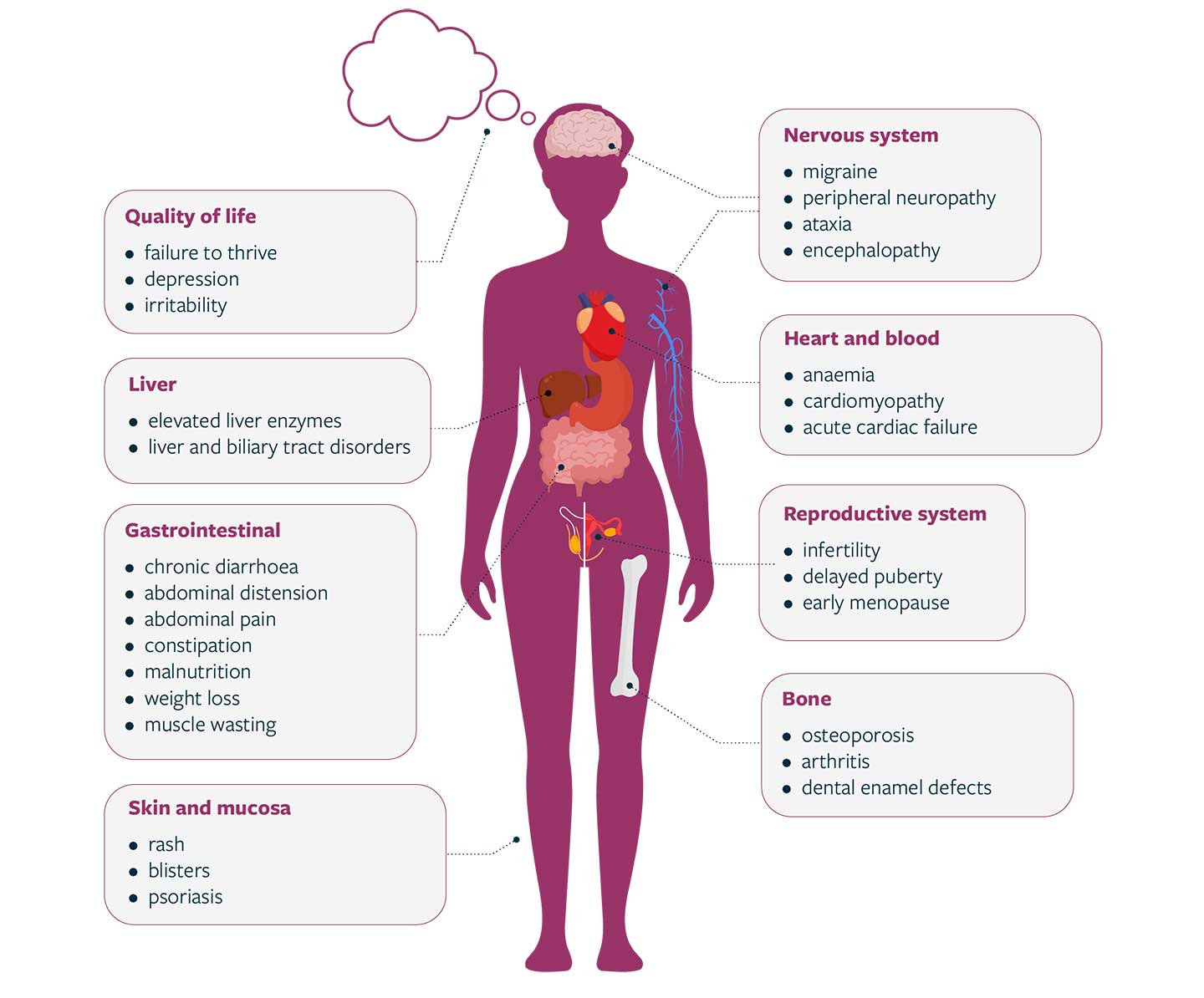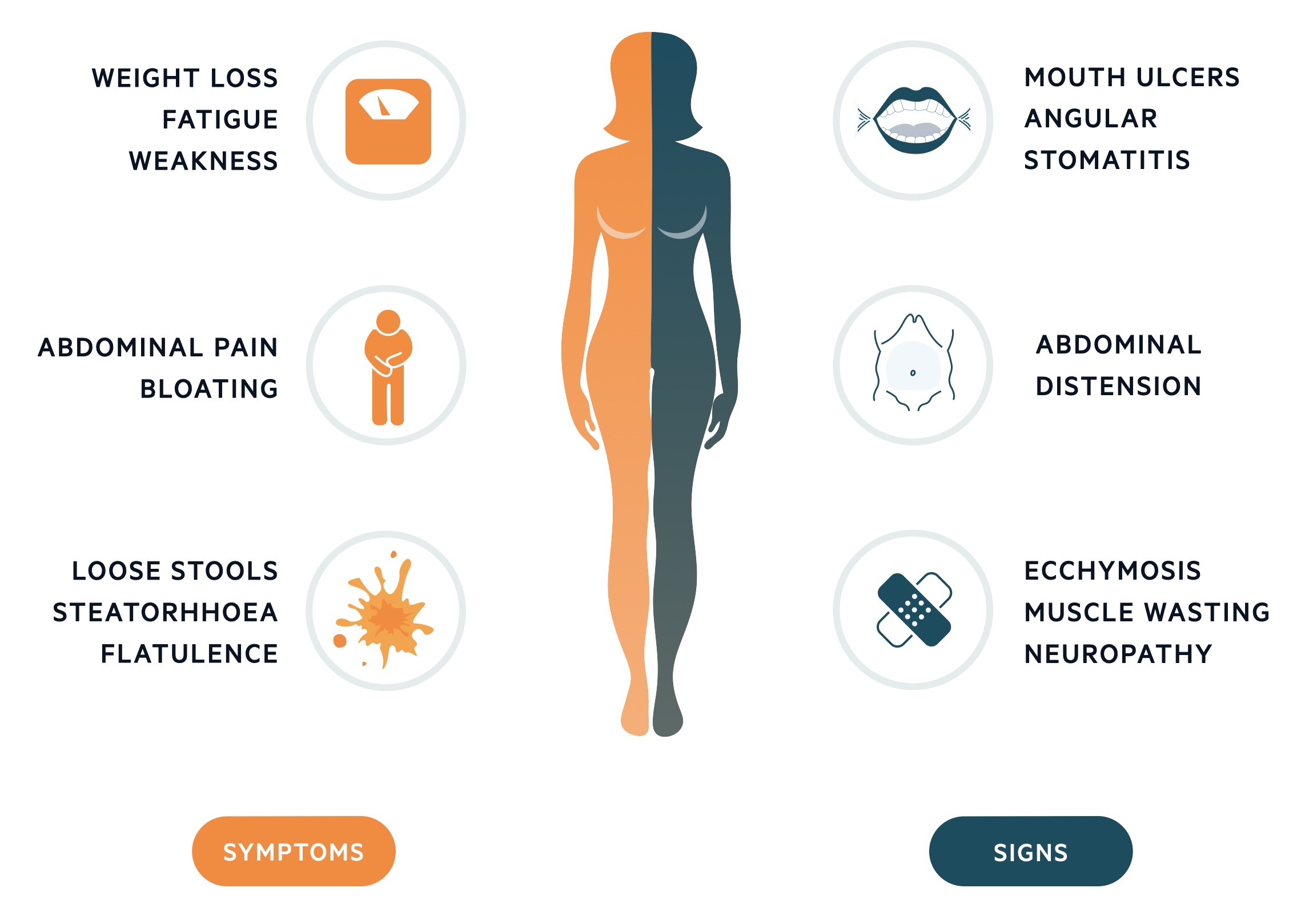
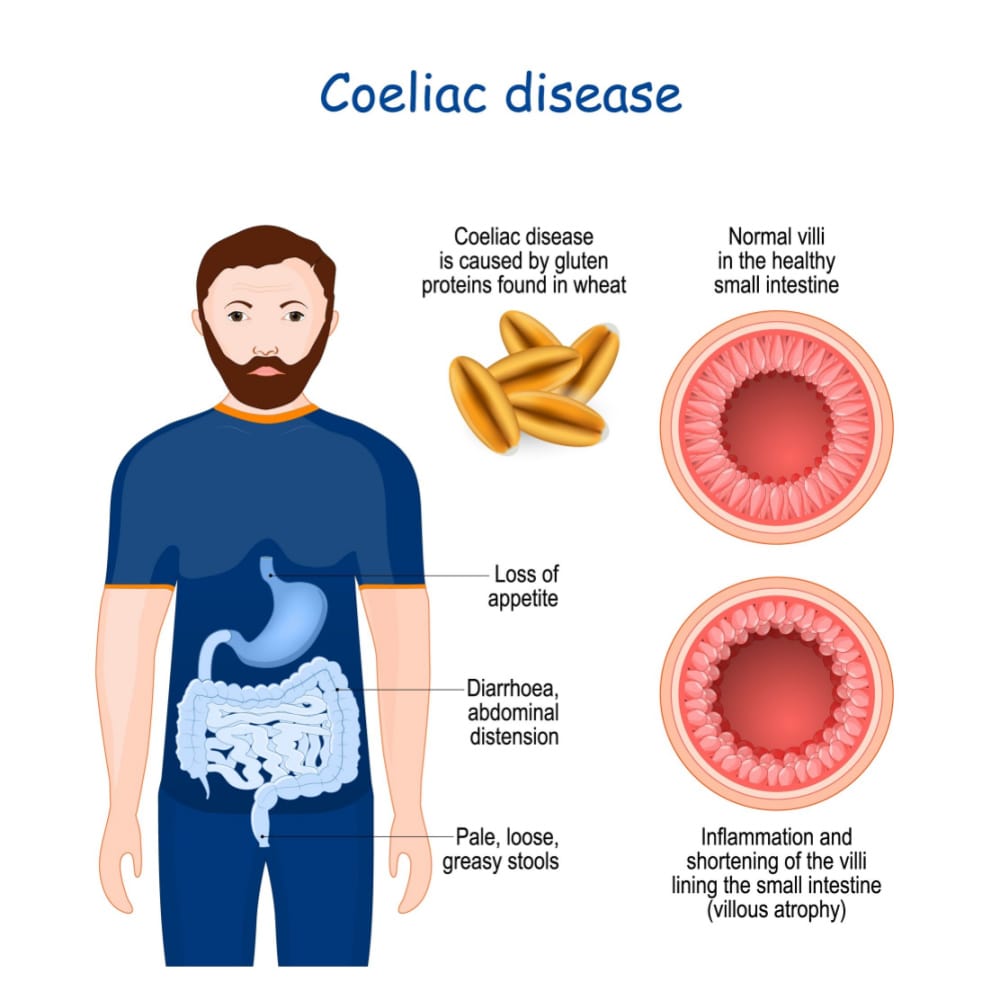

Coeliac disease
What is coeliac disease?
Coeliac disease (pronounced SEE-lee-ak) is an autoimmune disease. In people with coeliac disease, the lining of the small bowel is damaged by even tiny amounts of gluten. Gluten is a protein found in grains such as wheat, rye, barley and oats.
Coeliac disease affects people of all ages and genders. It runs in families and can develop at any age from infancy to adulthood. Currently, the only available treatment is with a gluten-free diet.
Early diagnosis and treatment of coeliac disease significantly reduces the risk of most complications.
You should tell family who share your genes (parents or siblings) that you have coeliac disease. They can also be tested.
What are the symptoms of coeliac disease?
People with coeliac disease can have severe symptoms, or they may have no obvious symptoms at all.
Common symptoms that affect the gastrointestinal tract (gut) include:
- diarrhoea or constipation
- bloating
- fatty stools (steatorrhoea)
- nausea
- vomiting
- flatulence (passing wind)
- feeling pain or discomfort in the tummy
Other symptoms and problems can include:
- low weight or slow weight gain in children
- feeling tired all of the time
- weight loss
- severe or persistent mouth ulcers
- irritability and depression
- failure to thrive, developmental delay or delayed puberty in children
- unexplained iron, vitamin B12 or folate deficiencies
- autoimmune thyroid disease
Many of these symptoms are very common and can occur because of other conditions. However, coeliac disease is under-diagnosed, so it’s important to consider it as a possible cause of your symptoms.
The most common symptoms in children less than 5 years of age are:
- diarrhoea
- irritability
- weight loss and slow growth
In older children, abdominal (tummy) pain is the most common symptom.
Up to half of people with coeliac disease don’t have symptoms. Even if you have no obvious symptoms, there may still be damage to your bowel.
It’s also important to be screened (tested) for coeliac disease if you have:
- early onset osteoporosis
- unexplained infertility
- a family history of coeliac disease
- liver disease
- Down syndrome
- Turner syndrome
- dermatitis herpetiformis (a skin condition linked with coeliac disease)
What causes coeliac disease?
It’s not yet known why people develop coeliac disease. If you have coeliac disease, your immune system’s response to gluten causes damage to the small intestine. The tiny, finger-like projections lining the bowel, called villi, become inflamed and flattened. This is called villous atrophy and it reduces the available surface area of the bowel to absorb nutrients from food.
Some of the factors associated with an increased risk of developing this disease are outlined below.
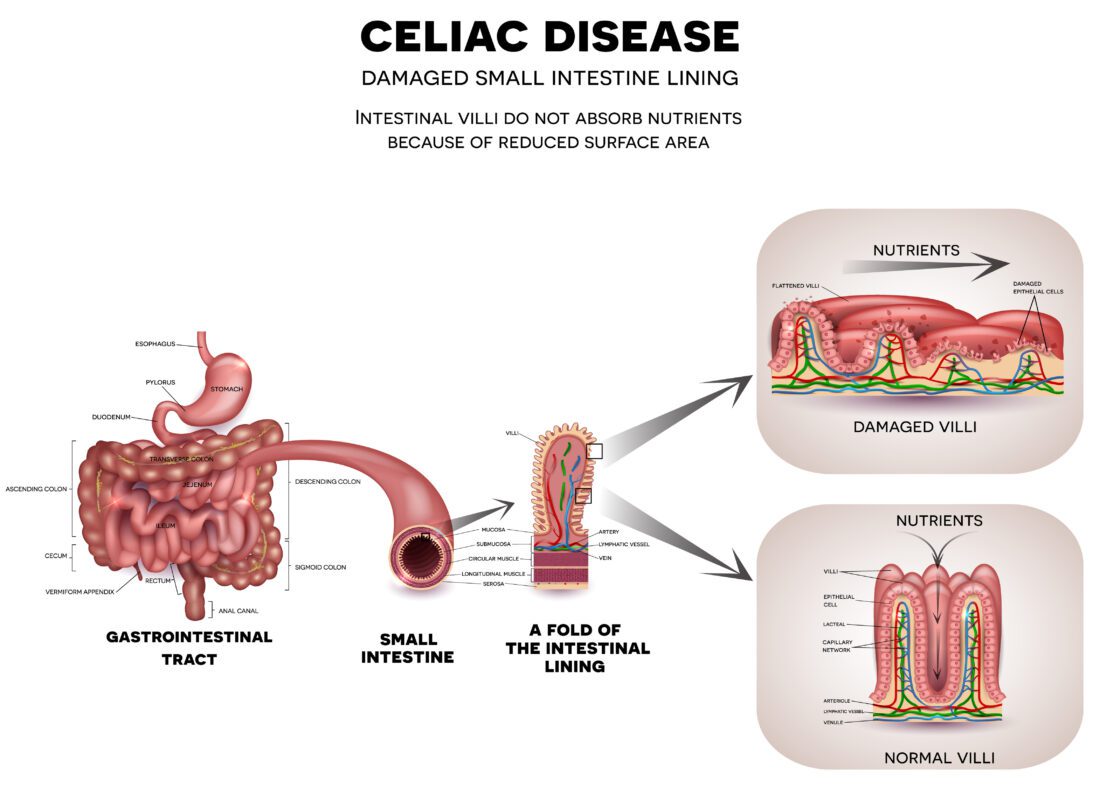
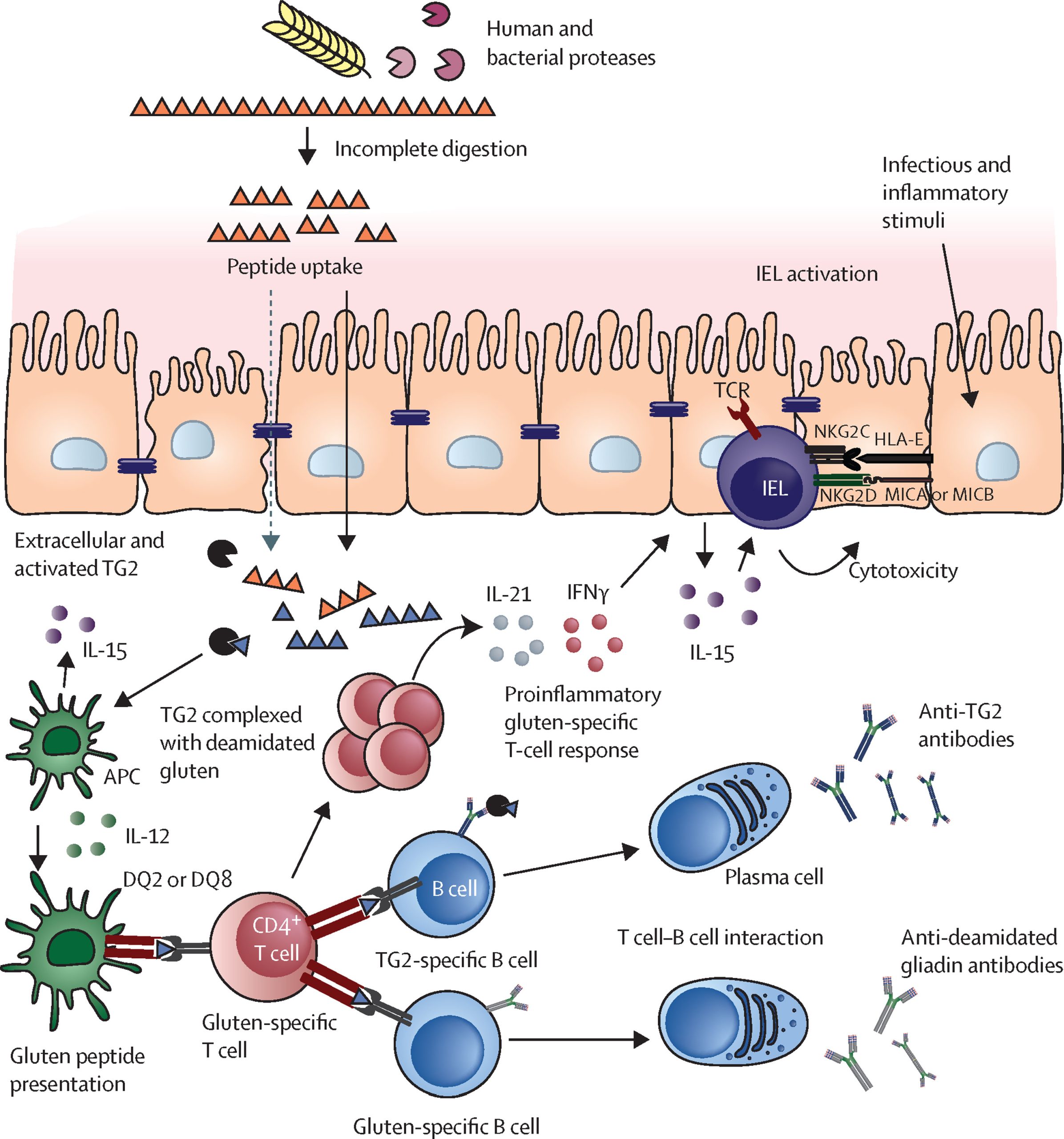
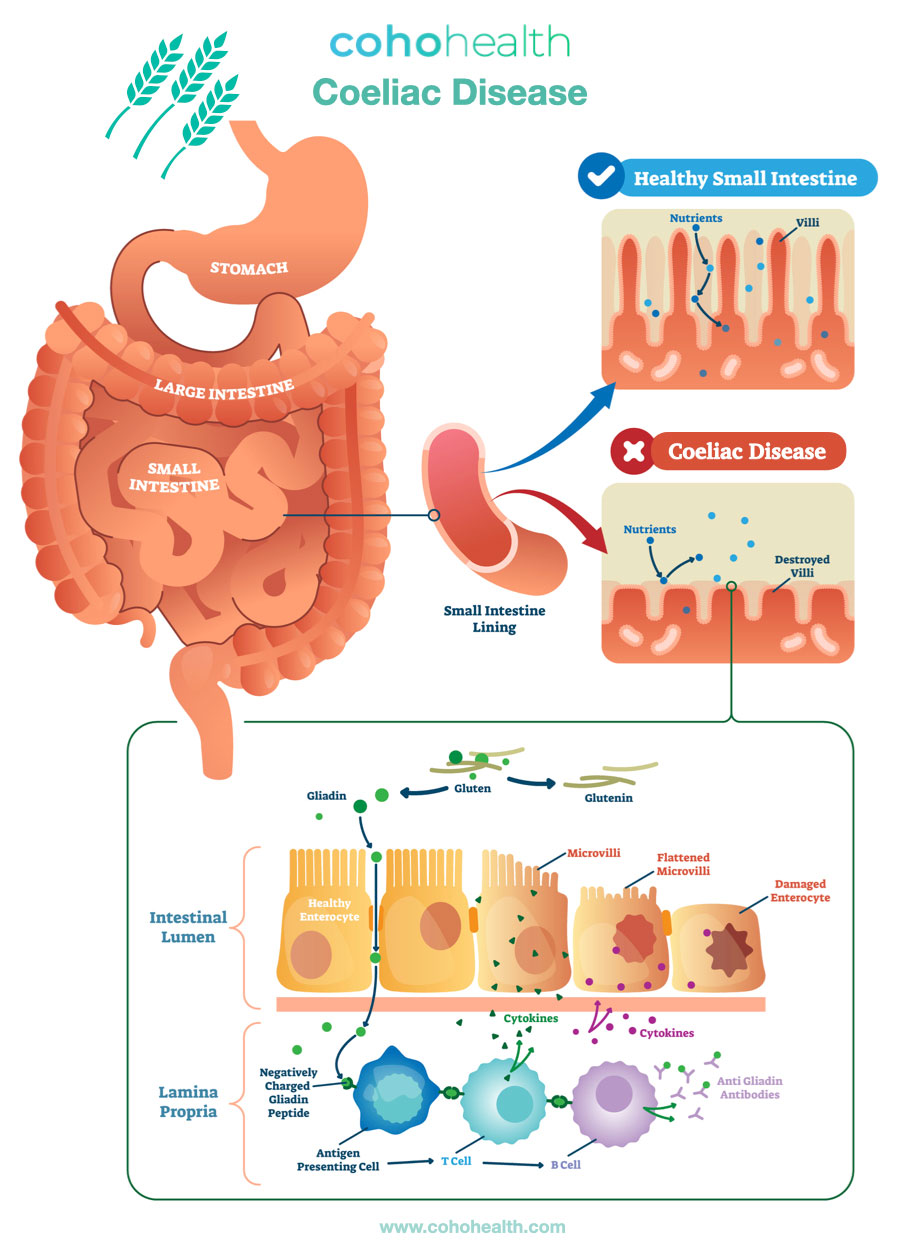
Family history
Coeliac disease runs in families. If you have a parent or sibling with coeliac disease your risk of developing the condition is about 10 times higher than someone without a family history.
Coeliac disease is strongly associated with the presence of certain genes called HLA DQ2 and HLA DQ8. Either one or both genes are present in almost every person with coeliac disease.
These genes are very common in people in Australia. Around 56% of the population carries either one or both genes. This suggests there is a further trigger needed for coeliac disease to develop.
Environmental factors
Environmental factors may trigger coeliac disease at any age in people who carry the genes for the disease. Factors thought to play a role include:
- a previous gastrointestinal infection (such as a rotavirus infection), or
- a person’s diet during early childhood.
Other health conditions
Health conditions associated with an increased risk of developing coeliac disease include:
- type 1 diabetes
- ulcerative colitis
- neurological disorders such as epilepsy
- thyroid disease
- Down syndrome
When should I see my doctor?
It is very important to be properly diagnosed with coeliac disease by a doctor because it is a serious medical condition that affects people for their whole life.
If you think you may have coeliac disease don’t stop eating foods that contain gluten until after you have been diagnosed as stopping gluten means the tests are unreliable. If you have started a gluten free diet then you will need to resume a normal diet for at least 6 weeks before you are tested. You will also need to eat a minimum of 4 slices of wheat-based bread for adults, and 2 slices for children, every day during this time. This is called a gluten challenge and will help to make sure your test results are reliable.
How is coeliac disease diagnosed?
The first step to diagnosis is to make an appointment with your doctor to discuss all the potential causes for your symptoms. If your doctor suspects coeliac disease, they will request the appropriate tests to make sure you are properly diagnosed.
Blood tests
Blood tests are used to screen for coeliac disease. They measure antibody levels in your blood that your body has produced in response to gluten. Blood tests may not be as reliable in children who are less than 4 years old because their antibody levels can fluctuate. They may need a repeat test 3 months later.
You won’t be diagnosed with coeliac disease if you just have a positive blood test. Diagnosis is only confirmed with a small bowel biopsy.
Small bowel biopsy
A small bowel biopsy is essential to confirm the diagnosis of coeliac disease.
It involves a procedure called a gastroscopy (a thin flexible tube inserted through your mouth and into the first part of the small bowel) and takes about 10 minutes under a light anaesthetic sedation. This allows a specialist doctor called a gastroenterologist to collect several tiny samples (biopsies) of your small bowel. A pathologist then examines the biopsies under a microscope for signs of damage (villous atrophy).
A diagnosis of coeliac disease will only be made if the biopsy results are positive for the disease.
Genetic tests
Genetic tests may be requested if the diagnosis of coeliac disease is uncertain. This can happen if the blood or small bowel biopsy results are not clear, or if you didn’t eat enough gluten to ensure the tests were reliable.
A negative genetic test for specific coeliac disease genes effectively rules out coeliac disease, but a positive test can’t diagnose the condition. They can only confirm if you have a genetic predisposition to coeliac disease.
These tests involve a blood test or a scraping from the inside of your cheek, and are not affected by the amount of gluten in your diet.
Alternative diagnostic methods
Beware of alternative diagnostic methods such as hair analysis, stool-based tests, iridology or Vega testing. These tests are unreliable, may delay diagnosis or give you an incorrect diagnosis and lead to unnecessary and ineffective treatments.
How is coeliac disease managed?
Coeliac disease can’t be cured, but it can be controlled with a strict, lifelong gluten free diet. Your sensitivity to gluten will never go away. The only way your small bowel can heal, and then stay healthy, is by removing all gluten from your diet, even if your symptoms are mild. Mild symptoms don’t mean you have a mild disease.
You can expect to have a blood test at 6 months and 12 after you are diagnosed, and then yearly after that, to check if you have been exposed to gluten. Your doctor may also request another small bowel biopsy about 18 to 24 months after you are diagnosed to make sure your bowel is healing. You will also need a medical review every year.
Gluten free diet
Maintaining a gluten free diet involves learning new skills including reading and interpreting food labels. Foods can be labeled gluten free in Australia if they don’t contain any detectable gluten, oats or malted ingredients.
Most packaged food in Australia must list ingredients from grains that contain gluten on their ingredient’s list. Alcoholic beverages are exempt from this labeling law. This means you will need to know which drinks are safe to consume and which are not. For example, all regular beers contain gluten. Your state coeliac association, or a dietitian, can help you understand which foods and drinks are gluten free.
You should also look for the crossed grain logo on packaged foods. This logo means the product has been reviewed and approved by Coeliac Australia and is suitable for a gluten free diet.
Can coeliac disease be prevented?
It is not possible to prevent coeliac disease. Studies have shown that delaying giving gluten to children or how long babies are breastfed doesn’t have any affect on whether they will develop coeliac disease when they grow older.
However, it is possible to prevent complications of coeliac disease by being diagnosed early and following a gluten free diet.
Complications of coeliac disease
Early diagnosis and treatment of coeliac disease can significantly reduce the risk of most complications ever occurring. However, it’s important to know that there are some other medical conditions associated with coeliac disease which occur for different reasons:
- The genes that predispose a person to coeliac disease also make them susceptible to other autoimmune conditions such as type 1 diabetes.
- The chronic inflammation that occurs in the small bowel in people with coeliac disease may also occur in other parts of the body such as the skin, joints, bones, liver, pancreas, thyroid gland, nervous system and reproductive system.
- The changes in the small bowel can lead to poor absorption of nutrients resulting in problems such as anaemia (a form of iron deficiency) and vitamin deficiencies.
Discuss complications related to coeliac disease with your doctor.
Complications related to diet
Carefully following a gluten free diet is very important for good management of coeliac disease. Long-term complications can occur when a gluten free diet is not followed. These include:
- increased risk of bowel lymphoma (a type of cancer)
- infertility
- chronic ill health
The risk of these complications is the same as the rest of the population when a gluten free diet is followed.
